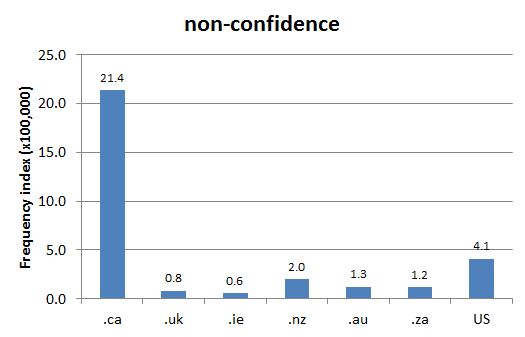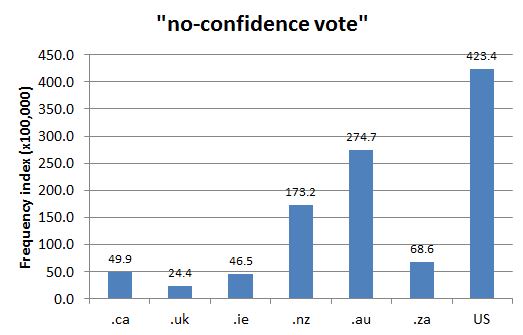DCHP-2
non-confidence DCHP-2 (July 2016)
n. & adj. — Politics, Law, Administration
an expression of lack of confidence in a government, or other governing body; often in vote or motion of non-confidence or non-confidence vote.
Type: 5. Frequency — The Prime Minister and the Cabinet must have the majority support, the "confidence", of the House of Commons. Votes may be taken by the House to determine whether there is confidence or non-confidence. If the result is non-confidence, the government is expected to resign. Parliament is then dissolved and a new election is called (see Parliament of Canada reference). If a budget fails to pass, this result also is seen as a non-confidence vote. These rules hold for the provinces as well; in territories where there are no parties, members hold the vote of non-confidence.
Non-confidence is a preservation from British English. It was in use in the UK in the 19th century (see, e.g. the 1844 quotation from the London Times), although it seems to have lost currency at the expense of the synonym "no-confidence".
In most other locations, "no-confidence" is the preferred term, while in Canada non-confidence is most prevalent (see Charts 1 & 2); however, "no-confidence" is also fairly common. Data suggest that prevalence of one term over the other fluctuates greatly depending on the compound and the lexicalized phrase used. For example, searches indicate that "motion of non-confidence" is four times more prevalent in .ca domains than "motion of no-confidence". However, "non-confidence motion" is 2.5 times less frequent in .ca domains than "no-confidence motion", suggesting that there is no general preference for one term over the other.
Similar tests conducted in .gc.ca domains (Canadian government domains) demonstrate a marked preference for non- over "no-", but not without exception.
See also COD-2, s.v. "non-confidence", which is marked "Cdn".See also: notwithstanding clause prorogue
References:
- COD-2
- Parliament of Canada "The Confidence Convention" Accessed 5 Jul. 2013
Images:
Chart 1: Internet Domain Search, 5 Jul. 2013
Chart 2: Internet Domain Search, 5 Jul. 2013

